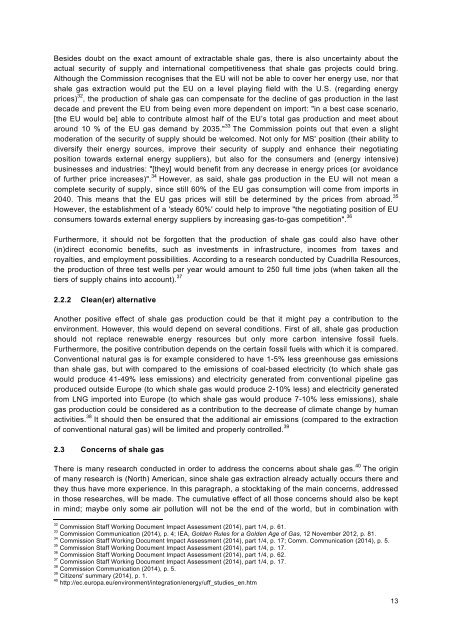Thesis-Anne-Vos-Masters-SBR-and-EU-Law-3
Thesis-Anne-Vos-Masters-SBR-and-EU-Law-3
Thesis-Anne-Vos-Masters-SBR-and-EU-Law-3
Create successful ePaper yourself
Turn your PDF publications into a flip-book with our unique Google optimized e-Paper software.
Besides doubt on the exact amount of extractable shale gas, there is also uncertainty about the<br />
actual security of supply <strong>and</strong> international competitiveness that shale gas projects could bring.<br />
Although the Commission recognises that the <strong>EU</strong> will not be able to cover her energy use, nor that<br />
shale gas extraction would put the <strong>EU</strong> on a level playing field with the U.S. (regarding energy<br />
prices) 32 , the production of shale gas can compensate for the decline of gas production in the last<br />
decade <strong>and</strong> prevent the <strong>EU</strong> from being even more dependent on import: "in a best case scenario,<br />
[the <strong>EU</strong> would be] able to contribute almost half of the <strong>EU</strong>’s total gas production <strong>and</strong> meet about<br />
around 10 % of the <strong>EU</strong> gas dem<strong>and</strong> by 2035." 33 The Commission points out that even a slight<br />
moderation of the security of supply should be welcomed. Not only for MS' position (their ability to<br />
diversify their energy sources, improve their security of supply <strong>and</strong> enhance their negotiating<br />
position towards external energy suppliers), but also for the consumers <strong>and</strong> (energy intensive)<br />
businesses <strong>and</strong> industries: "[they] would benefit from any decrease in energy prices (or avoidance<br />
of further price increases)". 34 However, as said, shale gas production in the <strong>EU</strong> will not mean a<br />
complete security of supply, since still 60% of the <strong>EU</strong> gas consumption will come from imports in<br />
2040. This means that the <strong>EU</strong> gas prices will still be determined by the prices from abroad. 35<br />
However, the establishment of a 'steady 60%' could help to improve "the negotiating position of <strong>EU</strong><br />
consumers towards external energy suppliers by increasing gas-to-gas competition". 36<br />
Furthermore, it should not be forgotten that the production of shale gas could also have other<br />
(in)direct economic benefits, such as investments in infrastructure, incomes from taxes <strong>and</strong><br />
royalties, <strong>and</strong> employment possibilities. According to a research conducted by Cuadrilla Resources,<br />
the production of three test wells per year would amount to 250 full time jobs (when taken all the<br />
tiers of supply chains into account). 37<br />
2.2.2 Clean(er) alternative<br />
Another positive effect of shale gas production could be that it might pay a contribution to the<br />
environment. However, this would depend on several conditions. First of all, shale gas production<br />
should not replace renewable energy resources but only more carbon intensive fossil fuels.<br />
Furthermore, the positive contribution depends on the certain fossil fuels with which it is compared.<br />
Conventional natural gas is for example considered to have 1-5% less greenhouse gas emissions<br />
than shale gas, but with compared to the emissions of coal-based electricity (to which shale gas<br />
would produce 41-49% less emissions) <strong>and</strong> electricity generated from conventional pipeline gas<br />
produced outside Europe (to which shale gas would produce 2-10% less) <strong>and</strong> electricity generated<br />
from LNG imported into Europe (to which shale gas would produce 7-10% less emissions), shale<br />
gas production could be considered as a contribution to the decrease of climate change by human<br />
activities. 38 It should then be ensured that the additional air emissions (compared to the extraction<br />
of conventional natural gas) will be limited <strong>and</strong> properly controlled. 39<br />
2.3 Concerns of shale gas<br />
There is many research conducted in order to address the concerns about shale gas. 40 The origin<br />
of many research is (North) American, since shale gas extraction already actually occurs there <strong>and</strong><br />
they thus have more experience. In this paragraph, a stocktaking of the main concerns, addressed<br />
in those researches, will be made. The cumulative effect of all those concerns should also be kept<br />
in mind; maybe only some air pollution will not be the end of the world, but in combination with<br />
32<br />
Commission Staff Working Document Impact Assessment (2014), part 1/4, p. 61.<br />
33<br />
Commission Communication (2014), p. 4; IEA, Golden Rules for a Golden Age of Gas, 12 November 2012, p. 81.<br />
34<br />
Commission Staff Working Document Impact Assessment (2014), part 1/4, p. 17; Comm. Communication (2014), p. 5.<br />
35<br />
Commission Staff Working Document Impact Assessment (2014), part 1/4, p. 17.<br />
36<br />
Commission Staff Working Document Impact Assessment (2014), part 1/4, p. 62.<br />
37<br />
Commission Staff Working Document Impact Assessment (2014), part 1/4, p. 17.<br />
38<br />
Commission Communication (2014), p. 5.<br />
39<br />
Citizens' summary (2014), p. 1.<br />
40<br />
http://ec.europa.eu/environment/integration/energy/uff_studies_en.htm<br />
13



